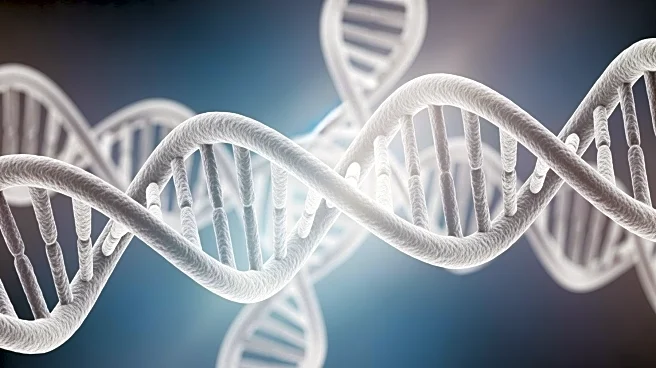What's Happening?
A recent study published in Nature investigates the behavior of cohesin loop extrusion in living cells and its effects on gene transcription. The research focuses on the interactions between RNA polymerase
II and cohesin complexes, which can hinder gene expression by obstructing the transcription machinery. The study utilized HAP1 and 293TX cell cultures to observe the dynamics of cohesin loop extrusion and its impact on chromatin structure. Various antibodies and plasmid constructions were employed to facilitate the experiments, which aimed to understand how cohesin complexes influence enhancer activity and gene transcription. The findings suggest that encounters between RNA polymerase and cohesin complexes may reduce local enhancer activity, thereby affecting gene expression. This research provides insights into the molecular mechanisms that regulate gene transcription and chromatin organization.
Why It's Important?
The study's findings have significant implications for understanding the regulation of gene expression and chromatin architecture. By elucidating the role of cohesin loop extrusion in gene transcription, the research contributes to the broader knowledge of genetic regulation and cellular function. This understanding is crucial for developing therapeutic strategies targeting genetic disorders and diseases linked to chromatin misregulation. The insights gained from this study could inform future research in genetics, molecular biology, and related fields, potentially leading to advancements in medical treatments and interventions.
What's Next?
Further research is needed to explore the frequency and conditions under which RNA polymerase encounters cohesin complexes during transcription. Investigating these interactions in different cell types and under various physiological conditions could provide a more comprehensive understanding of cohesin's role in gene regulation. Additionally, studies focusing on the therapeutic potential of modulating cohesin activity in genetic disorders may emerge, aiming to leverage these findings for clinical applications.
Beyond the Headlines
The study raises questions about the ethical considerations of manipulating genetic processes in living cells. As research progresses, discussions around the implications of genetic interventions and their potential impact on human health and society will become increasingly important. The long-term effects of altering chromatin structure and gene expression warrant careful consideration, particularly in the context of developing new medical treatments.









